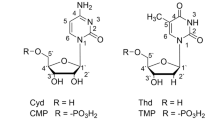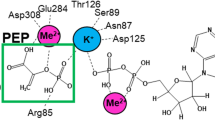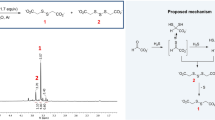Abstract
DURING the course of an investigation of the action of vitamin K and its biological antagonists (dicoumarol, salicylate) on various phosphatases, details of which will be published elsewhere, it was observed that liver hexosediphosphatase1 exhibited a much greater sensitivity towards quinones than did the other phosphatases. Purified bone phosphomonoesterase2, for example, required a concentration of 10-3 M benzoquinone for complete inactivation, whereas 10-5 M benzoquinone was sufficient completely to inhibit the hexosediphosphatase.
This is a preview of subscription content, access via your institution
Access options
Subscribe to this journal
Receive 51 print issues and online access
$199.00 per year
only $3.90 per issue
Buy this article
- Purchase on Springer Link
- Instant access to full article PDF
Prices may be subject to local taxes which are calculated during checkout
Similar content being viewed by others
References
Gomori, G., J. Biol. Chem., 148, 139 (1943).
Gulland, J. M., and Jackson, E. M., Biochem. J., 32, 590 (1938).
Geiger, W. B., and Conn, J. E., J. Amer. Chem. Soc., 67, 112 (1945). Wallenfels, K., Chemie, 51, 1 (1945).
Gould, B. S., J. Biol. Chem., 156, 365 (1944).
Barron, E. S. G., and Singer, T. P., J. Biol. Chem., 157, 232 (1945).
Hanes, C. S., Biochem. J., 29, 2588 (1935).
Giri, K. V., Nature, 141, 119 (1938); Biochem. J., 33, 309 (1939).
Author information
Authors and Affiliations
Rights and permissions
About this article
Cite this article
WALSH, E., WALSH, G. Inhibition of Hexosediphosphatase by Sulphhydryl Reagents and by Ascorbic Acid. Nature 161, 976–977 (1948). https://doi.org/10.1038/161976b0
Issue Date:
DOI: https://doi.org/10.1038/161976b0
This article is cited by
-
Transferase Activity of Hydrolytic Enzymes
Nature (1953)
-
Thiophosphates as Possible Intermediates in Phosphate Transfer
Nature (1952)
Comments
By submitting a comment you agree to abide by our Terms and Community Guidelines. If you find something abusive or that does not comply with our terms or guidelines please flag it as inappropriate.



